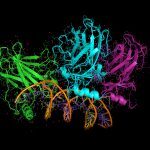Lien vers Pubmed [PMID] – 27676277
Pharmacogenomics 2016 Oct; 17(15): 1649-1674
Evaluate the potential of selected SNPs as predictors of methotrexate (MTX) therapeutic outcome.In total, 35 SNPs in 14 genes involved in MTX intracellular pathways and Phase II reactions were genotyped in 233 rheumatoid arthritis (RA) patients treated with MTX. Binary logistic regressions were performed by genotype/haplotype-based approaches. Non-Response- and Toxicity-Genetic Risk Indexes (Non-RespGRI and ToxGRI) were created.MTX nonresponse was associated to eight genotypes and three haplotypes: MTHFR rs1801131 AA and rs1801133 TT; MS rs1805087 AA; MTRR rs1801394 A carriers; ATIC rs2372536 C carriers, rs4673993 T carriers, rs7563206 T carriers and rs12995526 T carriers; CC for GGH rs3758149 and rs12681874; CGTTT for ATIC combination 1; and CTTTC for ATIC combination 2. From overall Non-RespGRI patients with indexes 6-8 had more than sixfold increased risk for MTX nonresponse than those patients with indexes 0-5. MTX-related toxicity was associated to five genotypes and two haplotypes: ATIC rs2372536 G carriers, rs3821353 T carriers, rs7563206 CC and rs12995526 CC; ADORA2A rs2267076 T; CTTCC for ATIC combination 1; and TC for ADORA2A rs2267076 and rs2298383. From overall ToxGRI, patients with indexes 3-4 had more than sevenfold increased risk for MTX-related toxicity than those patients with indexes 1-2.Genotyping may be helpful to identify which RA patients will not benefit from MTX treatment and, consequently, important to personalized medicine in RA. Nevertheless, further studies are required to validate these findings.

